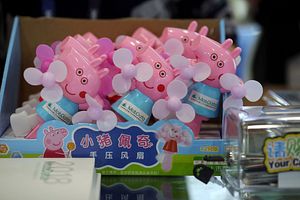Over 30,000 videos of the British cartoon character Peppa Pig were removed from the Chinese short-video app Douyin on April 28. Searches for “Peppa Pig” on the app returned no results. The search term has since been restored to functionality, although only a fraction of videos were returned to the site as of May 3. Though Bytedance, the Chinese technology company that owns Douyin, has yet to officially comment on the removal of the British cartoon character, the deletion of Peppa Pig is believed to be an act of self-censorship by Douyin rather than a government-ordered ban.
Peppa Pig, a British cartoon for children, gained unusual popularity among Chinese young adults on Douyin. Chinese young netizens transformed the innocent pink cartoon character into a gangster (or shehuiren in Mandarin) icon, who wears sunglasses, a gold chain, and smokes cigarettes. The viral videos became even crazier when people began to use Peppa Pig tattoo stickers to cover their arms, and draw the character on their naked back. The platform management apparently became worried – will these videos have an improper influence on the cartoon’s young target audience?
Self-censorship is a common practice among Chinese internet companies, including social media giants Sina Weibo and WeChat. During the Two Sessions this year, any posts with sensitive keywords, whether related to the meeting or not, were deleted by online community managers or failed the content check for publication. Some accounts were closed.
Back in 2010, Weibo, the Chinese version of Twitter, was regarded as an emerging platform for China’s unprecedented democratic progress, providing a rare communication channel between government officials and public. According to Wei Wei’s report for PLA Daily, registered Two Sessions representatives and Chinese People’s Political Consultative Conference members on Weibo increased from 47 in 2010 to 786 in 2012. The newspaper praised the microblog, saying it “plays an increasingly important role in public political participation, which is warmly welcomed by the mass public.” However, political participation on Weibo didn’t last long with the rise of WeChat, and several waves of more strict government regulations.
The Chinese social media giants, who have won China’s huge market of internet users, well understand the importance of timely, sufficient content regulation to their success and survival. Fanfou, the first Twitter clone in China, was forced to close in 2009 for 16 months in the censorship following the Urumqi Riots. The shutdown was brutal. Fanfou lost its market advantage to Sina, NetEasei, and Tencent in the early internet battle.
Peppa Pig is far from the only casualty of proactive self-censorship by web companies. During Sina Weibo’s three-month self-motivated cleanup operation of illegal content this April, the platform deleted all gay-themed posts, pictures, videos. This aroused public anger and online protests using the hashtag “I am gay, not a pervert.” The protest ended up with the removal of the gay ban after the state-owned People’s Daily published an article supporting sexual freedom.
WeChat, the multipurpose app developed by Chinese internet giant Tencent, has been regarded as a more private platform than Sina Weibo due to its closed infrastructure. As a super app with instant messaging, social networking, mobile payment, etc., it relies on technology tools to filter user-generated content, which is more efficient and accurate than Weibo’s labor-intensive censorship. WeChat not only blocks political sensitive texts in one-on-one conversations, group messages, and moments based on its keywords pool, it can also detect sensitive pictures.
Peppa Pig’s popularity in China has made billions of dollars for publishers like Anhui Children’s Publishing House, and manufacturers of Peppa Pig toys and tattoo stickers. It can also bring tremendous viewers and cash to Douyin. However, the company has predicted the potential harm of the cartoon character to its survival in China’s competitive internet market. As a rising online platform, Douyin will not risk its future by letting Peppa Pig keep going viral on its platform.
Biyun Song is a young professional based in Washington DC.

































